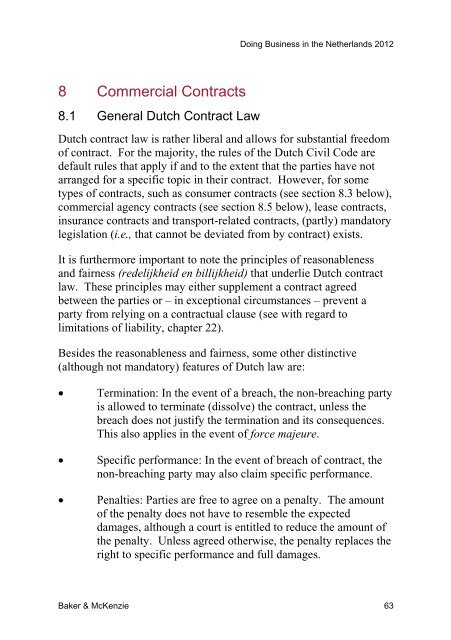Doing Business in the Netherlands 2012 - American Chamber of ...
Doing Business in the Netherlands 2012 - American Chamber of ...
Doing Business in the Netherlands 2012 - American Chamber of ...
You also want an ePaper? Increase the reach of your titles
YUMPU automatically turns print PDFs into web optimized ePapers that Google loves.
8 Commercial Contracts<br />
8.1 General Dutch Contract Law<br />
<strong>Do<strong>in</strong>g</strong> <strong>Bus<strong>in</strong>ess</strong> <strong>in</strong> <strong>the</strong> Ne<strong>the</strong>rlands <strong>2012</strong><br />
Dutch contract law is ra<strong>the</strong>r liberal and allows for substantial freedom<br />
<strong>of</strong> contract. For <strong>the</strong> majority, <strong>the</strong> rules <strong>of</strong> <strong>the</strong> Dutch Civil Code are<br />
default rules that apply if and to <strong>the</strong> extent that <strong>the</strong> parties have not<br />
arranged for a specific topic <strong>in</strong> <strong>the</strong>ir contract. However, for some<br />
types <strong>of</strong> contracts, such as consumer contracts (see section 8.3 below),<br />
commercial agency contracts (see section 8.5 below), lease contracts,<br />
<strong>in</strong>surance contracts and transport-related contracts, (partly) mandatory<br />
legislation (i.e., that cannot be deviated from by contract) exists.<br />
It is fur<strong>the</strong>rmore important to note <strong>the</strong> pr<strong>in</strong>ciples <strong>of</strong> reasonableness<br />
and fairness (redelijkheid en billijkheid) that underlie Dutch contract<br />
law. These pr<strong>in</strong>ciples may ei<strong>the</strong>r supplement a contract agreed<br />
between <strong>the</strong> parties or – <strong>in</strong> exceptional circumstances – prevent a<br />
party from rely<strong>in</strong>g on a contractual clause (see with regard to<br />
limitations <strong>of</strong> liability, chapter 22).<br />
Besides <strong>the</strong> reasonableness and fairness, some o<strong>the</strong>r dist<strong>in</strong>ctive<br />
(although not mandatory) features <strong>of</strong> Dutch law are:<br />
� Term<strong>in</strong>ation: In <strong>the</strong> event <strong>of</strong> a breach, <strong>the</strong> non-breach<strong>in</strong>g party<br />
is allowed to term<strong>in</strong>ate (dissolve) <strong>the</strong> contract, unless <strong>the</strong><br />
breach does not justify <strong>the</strong> term<strong>in</strong>ation and its consequences.<br />
This also applies <strong>in</strong> <strong>the</strong> event <strong>of</strong> force majeure.<br />
� Specific performance: In <strong>the</strong> event <strong>of</strong> breach <strong>of</strong> contract, <strong>the</strong><br />
non-breach<strong>in</strong>g party may also claim specific performance.<br />
� Penalties: Parties are free to agree on a penalty. The amount<br />
<strong>of</strong> <strong>the</strong> penalty does not have to resemble <strong>the</strong> expected<br />
damages, although a court is entitled to reduce <strong>the</strong> amount <strong>of</strong><br />
<strong>the</strong> penalty. Unless agreed o<strong>the</strong>rwise, <strong>the</strong> penalty replaces <strong>the</strong><br />
right to specific performance and full damages.<br />
Baker & McKenzie 63





![912.025 AmCham News [1] - American Chamber of Commerce in ...](https://img.yumpu.com/9328612/1/190x127/912025-amcham-news-1-american-chamber-of-commerce-in-.jpg?quality=85)

